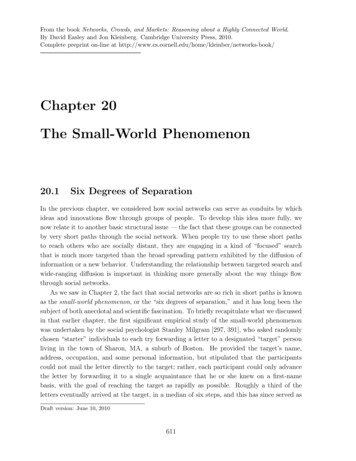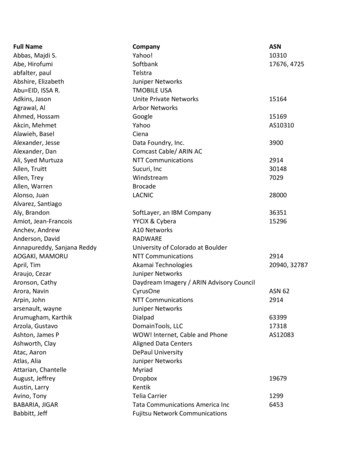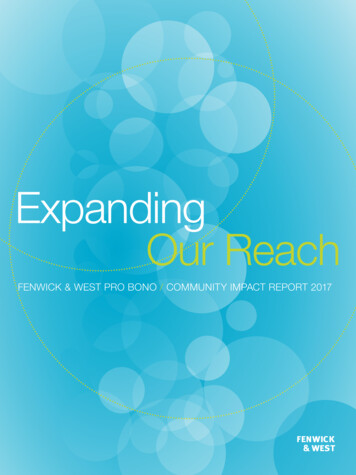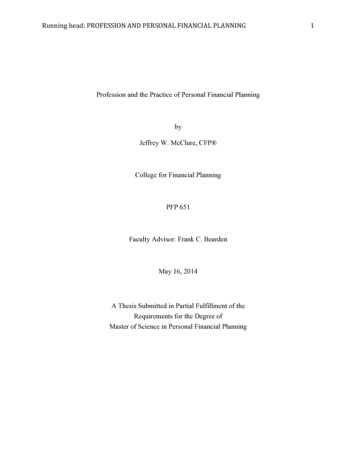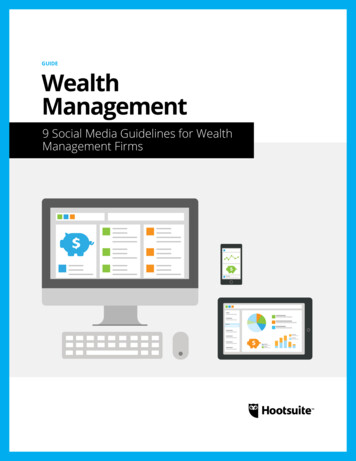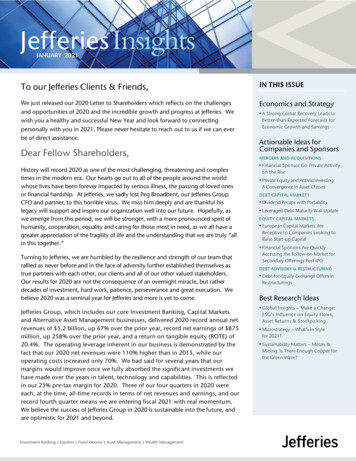
Transcription
JANUARY 2021To our Jefferies Clients & Friends,IN THIS ISSUEWe just released our 2020 Letter to Shareholders which reflects on the challengesand opportunities of 2020 and the incredible growth and progress at Jefferies. Wewish you a healthy and successful New Year and look forward to connectingpersonally with you in 2021. Please never hesitate to reach out to us if we can everbe of direct assistance.Economics and StrategyDear Fellow Shareholders,History will record 2020 as one of the most challenging, threatening and complextimes in the modern era. Our hearts go out to all of the people around the worldwhose lives have been forever impacted by serious illness, the passing of loved onesor financial hardship. At Jefferies, we sadly lost Peg Broadbent, our Jefferies GroupCFO and partner, to this horrible virus. We miss him deeply and are thankful hislegacy will support and inspire our organization well into our future. Hopefully, aswe emerge from this period, we will be stronger, with a more pronounced spirit ofhumanity, cooperation, equality and caring for those most in need, as we all have agreater appreciation of the fragility of life and the understanding that we are truly “allin this together.”Turning to Jefferies, we are humbled by the resilience and strength of our team thatrallied as never before and in the face of adversity further established themselves astrue partners with each other, our clients and all of our other valued stakeholders.Our results for 2020 are not the consequence of an overnight miracle, but ratherdecades of investment, hard work, patience, perseverance and great execution. Webelieve 2020 was a seminal year for Jefferies and more is yet to come.Jefferies Group, which includes our core Investment Banking, Capital Marketsand Alternative Asset Management businesses, delivered 2020 record annual netrevenues of 5.2 billion, up 67% over the prior year, record net earnings of 875million, up 258% over the prior year, and a return on tangible equity (ROTE) of20.4%. The operating leverage inherent in our business is demonstrated by thefact that our 2020 net revenues were 110% higher than in 2015, while ouroperating costs increased only 70%. We had said for several years that ourmargins would improve once we fully absorbed the significant investments wehave made over the years in talent, technology and capabilities. This is reflectedin our 23% pre-tax margin for 2020. Three of our four quarters in 2020 wereeach, at the time, all-time records in terms of net revenues and earnings, and ourrecord fourth quarter means we are entering fiscal 2021 with real momentum.We believe the success of Jefferies Group in 2020 is sustainable into the future, andare optimistic for 2021 and beyond.Investment Banking Equities Fixed Income Asset Management Wealth Management A Strong Global Recovery Leads toBetter-than-Expected Forecasts forEconomic Growth and EarningsActionable Ideas forCompanies and SponsorsMERGERS AND ACQUISITIONS Financial Sponsor Go-Private Activityon the Rise Private Equity and Activist Investing:A Convergence in Asset ClassesDEBT CAPITAL MARKETS Dividend Recaps with Portability Leveraged Debt Maturity Wall UpdateEQUITY CAPITAL MARKETS European Capital Markets AreReceptive to Companies Looking toRaise Start-up Capital Financial Sponsors Are QuicklyAccessing the Follow-on Market forSecondary Offerings Post-IPODEBT ADVISORY & RESTRUCTURING Debt-for-Equity Exchange Offers inRestructuringsBest Research Ideas Global Insights – Make a Change:ESG’s Influence on Equity Flows,Asset Returns & Stockpicking Microstrategy – What’s in Stylefor 2021? Sustainability Matters – Metals &Mining: Is There Enough Copper forthe Green Wave?
JANUARY 2021Jefferies Financial Group, our consolidated enterprise, recorded net income of 768 million, or 2.65 per fully dilutedshare, and adjusted ROTE was 11.7%. These results were held back by 101 million in non-cash charges at HomeFed andJETX in the first half of the year, as well as a 44 million non-cash charge to write-down our WeWork position to a deminimis amount.Jefferies Financial Group returned 974 million in capital to shareholders in 2020 through 161 million in cash dividendsand 813 million in share repurchases (42 million shares at an average of 19.29 per share). Over the past three fiscalyears, Jefferies has returned to shareholders nearly 3.4 billion, or 44% of tangible shareholders’ equity at the beginning ofthis effort. Yet, we closed fiscal year 2020 with tangible shareholders' equity of 7.5 billion, roughly equal to the level atthe beginning of the three-year period. On a fully diluted per share basis, tangible book value increased from 20.48 threeyears ago to 27.38 at November 30, 2020. The combination of this 34% increase in tangible book value per share plus 3.05 per share for the three years in dividends and the Spectrum Brands distribution, delivered a 49% return toshareholders for this period. We finished 2020 with parent company liquidity of 1.9 billion and Jefferies Group ended theyear with all-time record liquidity of 8.6 billion.Our strategy remains straightforward and designed to complete the transformation of Jefferies into a pure financial servicesfirm that is a global leader in Investment Banking, Capital Markets and Alternative Asset Management. With ourcontinuing efforts to smartly manage down our legacy Merchant Banking portfolio, we intend to reinvest in our corebusiness, while continuing to return excess capital to shareholders through buybacks and dividends. We expect JefferiesFinancial Group's consolidated ROTE to converge over time with that of Jefferies Group. It should go without saying (butwe will still say it and live it) that long-term stability and success will continue to require prudence in risk, liquidity andcapital management and will be consistent with our respect for our obligations to all constituencies, including creditors,rating agencies, regulatory bodies, and the communities in which we live and operate.Consistent with our stated plan, we are actively managing the legacy Merchant Banking portfolio for optimal value. Wecarry our remaining Merchant Banking investments on our balance sheet at their tangible book value of 1.9 billion. Sincemid-2012 when Jefferies and Leucadia began the process toward merging, we have sold our interests in eleven businessesfor 4.7 billion in proceeds and recognized pre-tax gains of 2.4 billion in aggregate, or 122% above tangible book value.We believe there is solid upside in the remaining portfolio.We continue to believe that the stock market has neither fully appreciated the uniqueness and momentum of the Jefferiescore operating platform, nor the sum of the value of our businesses and assets. We have taken advantage over the pastthree years of what we consider a “once in a lifetime” opportunity to reduce our fully diluted number of sharesoutstanding dramatically from 373 million to 274 million at prices that represent a substantial discount to both tangibleand intrinsic value. As significant and long-term minded shareholders, we are thrilled that this massive reduction in sharecount has increased our personal ownership percentage and we are happy to let this commitment speak for itself.Similarly, we easily could just stop here and allow the facts above to speak for themselves, but we believe that at thismoment in the world, there are important topics that deserve to be addressed:COVID-19 and CultureWith our combined 50 years at Jefferies and 70 years on Wall Street, we have endured many cycles and our share ofcrises. COVID-19 presented us with the most challenging set of threats we have ever faced. Not the least of these was atthe onset, when our team successfully dealt with the historically unthinkable task of getting everyone safely working athome, while instantaneously transforming Jefferies Group from a firm with 41 regularly attended and densely populatedglobal offices to a community operating from 3,822 individual home offices across four continents. This seamlessevacuation and transformation (amid record market volumes, and broad corporate needs for advice and capital) strove toInvestment Banking Equities Fixed Income Asset Management Wealth Management2
JANUARY 2021keep our precious employee-partners safe from the virus, while helping our clients navigate the staggering economic andmarket impact of the pandemic. Jefferies overcame this challenge not just because of the quality and commitment of ourteam, but also because of the strong bond of partnership, trust, camaraderie and transparency that defines our culture andpermeates our firm. We also had a secret weapon that heroically enabled us to seamlessly protect our firm and serve ourclients: our incredibly talented technology and support teams. We could not be any prouder of the entire Jefferies family.Living in a COVID-19 WorldWe believe that 2021 will be a year of forward transition for society, thanks to the miraculous brilliance of our scientists andmedical professionals who have developed vaccines that are beginning to rollout across the U.S. and world, hopefully on afair-minded and transparent, prioritized basis. We caution everyone against premature celebration. This will be afrustrating and complex process of mass producing the vaccines, moving them properly through fill and finish technology,transporting them and ultimately administering the injections to all of us. We believe 2021 will be a dangerous year ofmaking sure nobody gets careless or reckless as the COVID-19 war winds down and peacetime approaches. As such, wewill continue to stress flexibility in allowing each member of the Jefferies team to decide personally whether and when tocome to the office. We implore everyone to follow all the rules of social distancing, continual proper hygiene and wearinga mask whenever at possible risk. There will be a great deal to enjoy once this pandemic eases and we want to make surethe party will be as big as possible.Future of Work at JefferiesAs we said above, COVID-19 will eventually be a crisis that ends. We learned that we all have much more flexibility thanwe ever realized in how, where and when we can work. The question therefore is: What does the future of work look likeand how can we best design the operating environment of Jefferies to incorporate the needs and desires of our clients andour team? We started our process of developing perspective on this opportunity by sending out a fulsome survey to ourpeople, asking many of the most relevant questions regarding how and where they want to work in the future. We areholding focus groups and leadership discussions around this topic. This will be an ongoing work in process and there isno doubt our thoughts will evolve as time passes and we learn more. That said, it is clear that there will be some versionof a hybrid model going forward, creating a combination of a series of active central offices and meeting places, balancedwith the opportunity to work from home. This will have implications for the size and layout of our offices, technologydecisions, ability for people to live in a greater radius of their primary Jefferies location, and the elimination of themisguided notion that people raising families or caring for ailing loved ones can’t be completely effective when they spendtime at home. We don’t know where this exercise will lead, but are optimistic that if we listen to our people and effectivelybalance their needs with our opportunities to serve our clients, the end result will be extremely positive for everyone. Wewish it didn’t take a pandemic to show us this was possible, but we certainly aren’t going to let any of these newfoundinsights go to waste.Diversity, Equity and InclusionAnother regrettable, but very important realization in 2020, is the incontrovertible fact that there are serious systemicissues of racial inequality and exclusion permeating at least the U.S. and Europe, and it is up to all of us to accept andembrace this truth and do something about it. There was always a realization around this issue, but when we eachwatched video after video of this stark and painful reality, it became the last wake-up call we needed. Businesses mustchampion these causes and Jefferies is striving to do more than ever. We are extremely thankful that as a result ofinitiatives over the years, we now have six active Diversity, Equity and Inclusion Groups within our firm: J-NOBLE, jWIN,JEMS, jMosaic , jVETS and NextGen. While they are empowered to help us be better, the fact is that it is up to every one ofus to do our fair share and Jefferies will be relentless in our efforts.Investment Banking Equities Fixed Income Asset Management Wealth Management3
JANUARY 2021U.S. GovernmentIn March, we very actively and publicly expressed our opinion that governments needed to act smartly, swiftly and inhuge scale to prevent an explosion of unemployment, an implosion in the financial markets and the destruction of fartoo many businesses that did absolutely nothing wrong. In the U.S., our political leaders on both sides of the aisle tookactions that brought a desperately needed measure of stability to the economy. The economy is somewhat better todayand the financial markets are projecting a return to health in a post-pandemic world, but reality is that far too manypeople and businesses are still in too much trouble and this winter will be very hard. We are writing this as someincremental stimulus has been approved. This will help, but may not be sufficient. We implore both U.S. politicalparties to put aside their differences and come together again now in 2021 and provide a truly sufficient backstop forthose most in need, particularly essential workers and their families. We cannot let these people down just as the end ofthis calamity is finally in sight.Privilege and ResponsibilityThere are some businesses, including Jefferies, that have been remarkably resilient and fortunate throughout thispandemic. COVID-19 has been hard on everyone and nobody is immune from its consequences, but the truth is thatsome people have been much more fortunate than others. We count ourselves and Jefferies in this category. There aremany others. We would like to remind everyone, including ourselves, that it is a privilege to be in this position and everyone of us needs to accept the responsibility that there is much we can do to help others who have been adverselyimpacted much more dramatically only because their circumstances made them more vulnerable.Through our corporate philanthropy and support of volunteerism, Jefferies strives to make a positive difference in thecommunities in which we live and work. In this vein, in January, our firm, our employee-partners and our clients bandedtogether to provide A 4 million of support for the wildfire relief efforts in Australia. In May, to honor Peg’s memory, weled the donation of 9.25 million to over 85 different charities on the front lines of helping those in need in the face ofCOVID-19. There is more that we must and will do.Culture defines every enterprise and we believe Jefferies benefits from our unique Wall Street culture of partnership,service, nimbleness, drive and humility. Inside Jefferies, we doubled down in 2020 on our people, their safety, theirphysical and mental well-being, their personal development and their commitments to each other, to justice and equity,and to society at large. As a people-driven business, our greatest contribution to the world flows through our team ofoutstanding and special individuals. We are committed to caring, service and accountability.Annual Meeting and Investor MeetingWe look forward to answering your questions at our upcoming Annual Meeting on March 25, 2021. We also will holdour annual Jefferies Investor Meeting on October 12, 2021, at which time you will have the opportunity to hear fromour senior leaders across the Jefferies platform. We thank all of you—our clients and customers, employee-partners,fellow shareholders, bondholders, vendors and all others associated with our businesses—for your continuedpartnership and support.Sincerely,RICH HANDLERCEO, Jefferies Financial ich Twitter InstagramPronouns: he, him, hisBRIAN FRIEDMANPresident, Jefferies Financial nt Banking Equities Fixed Income Asset Management Wealth Management4
JANUARY 2021AppendixThe following tables reconcile financial results reported in accordance with generally accepted accounting principles (“GAAP”) to non-GAAP financial results. The shareholders’ lettercontains non-GAAP financial information to aid investors in viewing our businesses and investments through the eyes of management while facilitating a comparison across historicalperiods. However, these non-GAAP financial measures should be viewed in addition to, and not as a substitute for, reported results prepared in accordance with GAAP.JEFFERIES GROUPJEFFERIES FINANCIAL GROUPCalculation of 2020 Return on Tangible Equity (ROTE) (1)Calculation of Tangible Book Value per Fully Diluted Share (3)(Unaudited)Year EndedNov. 30, 2020( millions)Net earnings attributable to Jefferies Group LLC ( millions)(Unaudited)Nov. 30, 2020 Dec. 31, 2017Shareholders’ equity (GAAP)Less: Intangible assets, net and goodwillTangible shareholders’ equity (non-GAAP) 879Reconciliation of Member’s Equity to Tangible Member’s EquityNov. 30, 2019Member’s equity (GAAP)Less: Intangible assets, net and goodwillTangible member’s equity (non-GAAP)Reconciliation of Shareholders’ Equity to Tangible Shareholders’ Equity 6,125(1,814)4,311 Return on tangible equity20.4%JEFFERIES FINANCIAL GROUPCalculation of 2020 Adjusted Return on Tangible Equity (ROTE) (2) 9,404 (1,913)7,490 10,106(2,463)7,643Reconciliation of Shares Outstanding to Fully Diluted Shares OutstandingShares outstanding (GAAP)Restricted Stock Units (“RSUs”)Other dilutive sharesFully diluted shares outstanding (non-GAAP) (4)(Unaudited)Nov. 30, 2020 Dec. 31, 2017250356231611274373Tangible book value per fully diluted share (millions)( millions)(Unaudited)Year EndedNov. 30, 2020Reconciliation of Net Income to Adjusted Net IncomeNet income attributable to common shareholders (GAAP)Intangible amortization and impairment expense, net of taxAdjusted net income (non-GAAP) 77011781Reconciliation of Shareholders’ Equity to Adjusted Tangible Shareholders’ EquityNov. 30, 2019Shareholders’ equity (GAAP) Less: Intangible assets, net and goodwillLess: Deferred tax assetLess: Weighted average impact of 2020 cash dividends andshare repurchasesAdjusted tangible shareholders’ equity (non-GAAP)9,580(1,923)(462)27.38 20.48JEFFERIES FINANCIAL GROUPReconciliation of Book Value to Tangible Book Value of Merchant Banking Portfolio( millions)(Unaudited)Nov. 30, 2020Book value of Merchant Banking portfolio (GAAP) Less: Intangible assets, net and goodwillTangible book value of Merchant Bankingportfolio (non-GAAP) 1,940(49)1,892JEFFERIES FINANCIAL GROUPReconciliation of Book Value to Tangible Book Value of Merchant Banking Assets Sold(545) Adjusted return on tangible equity( millions)6,64911.7%Book value of Merchant Banking assets soldsince mid-2012 (GAAP) Less: Intangible assets, net and goodwillTangible book value of Merchant Banking assetssold since mid-2012 (non-GAAP)2,593(323) 2,270Notes:(1) Jefferies Group ROTE is equal to 2020 Net earnings attributable to Jefferies Group LLC divided by beginning of year Tangible member’s equity.(2) Jefferies Financial Group Adjusted ROTE is equal to 2020 Adjusted net income divided by beginning of year Adjusted tangible shareholders’ equity.(3) Jefferies Financial Group Tangible book value per fully diluted share is equal to Tangible shareholders’ equity divided by Fully diluted shares outstanding.(4) Fully diluted shares outstanding exclude preferred shares as they are antidilutive. Fully diluted shares outstanding include vested RSUs as well as the target number of RSUsissuable under senior executive compensation plans.Cautionary Note on Forward-Looking StatementsThis letter contains "forward-looking statements" within the meaning of the safe harbor provisions of Section 27A of the Securities Act of 1933 and Section 21E of the Securities Act of1934. Forward-looking statements include statements about our future and statements that are not historical facts. These forward-looking statements are usually preceded by thewords "should," "expect," "intend," "may," "will," or similar expressions. Forward-looking statements may contain expectations regarding revenues, earnings, operations, and otherresults, and may include statements of future performance, plans, and objectives. Forward-looking statements also include statements pertaining to our strategies for futuredevelopment of our businesses and products. Forward-looking statements represent only our belief regarding future events, many of which by their nature are inherently uncertain. Itis possible that the actual results may differ, possibly materially, from the anticipated results indicated in these forward-looking statements. Information regarding important factors,including Risk Factors that could cause actual results to differ, perhaps materially, from those in our forward-looking statements is contained in reports we file with the SEC. You shouldread and interpret any forward-looking statement together with reports we file with the SEC.Past performance may not be indicative of future results. Different types of investments involve varying degrees of risk. Therefore, it should not be assumed that future performance ofany specific investment or investment strategy will be profitable or equal the corresponding indicated performance level(s).Investment Banking Equities Fixed Income Asset Management Wealth Management5
JANUARY 2021Economics and StrategyA Strong Global Recovery Leads to Better-than-Expected Forecasts for Economic Growth and EarningsIn the U.S., Jefferies Chief Financial Economist Aneta Markowska expects growth to average at an above-consensus 5.25%next year, with a positive inflection point in January. While she expects the initial boost to come from fiscal stimulus, Anetabelieves that by Q2 the vaccine will allow the private sector to take the baton by unleashing pent-up demand in servicespending. Meanwhile, she believes ultra-low inventories will continue to drive manufacturing and housing activity andfurther highlights that financial markets have climbed the wall of worry on the vaccine and fiscal stimulus, and those risksare now gone. The main worry for 2021 is inflation and the Fed, however Aneta doesn’t expect these risks to materialize.Despite stronger demand, she expects inflation pressures to ease on improving supply-side dynamics, both in the laborand goods markets, keeping the Fed from tapering until early 2022.On a similar note, Chief European Financial Economist David Owen believes that with a vaccine being rolled out we can bemuch more confident about a strong recovery, albeit with deep economic scarring, from Q2 onward if a no deal Brexit canbe avoided. Both monetary and fiscal policy will likely remain very accommodative, with the BoE potentially goingnegative in 2021. Brexit will bring a fundamental change in the economic geography of Europe, as the UK leaves the singlemarket and customs union of the EU. David further points out that importantly, unlike the GFC, COVID-19 has brought arapid pace of innovation and spending on pure science and research. Combined with an increasing focus on measures tocombat climate change, he expects a rapid pace of company formation and a wave of mergers and acquisitions.Chief Market Strategist David Zervos highlighted that recent price action has offered a clear view of what’s in store duringthe upcoming recovery phase of this cycle. He believes the market is beginning to price in what he refers to as “thehandoff,” a point in the cycle where monetary policy takes a backseat to private-sector animal spirits. This transitionreplaces constant Fed support with true, organic economic growth—and marks when depressed expected real returns onrisky investments turn the corner and start to rise markedly. David points out that there is a conditioning during the earlyphases of a downturn that associates dollar strength with system stress and risk-off. However, this reverses course whenthe Fed finally gets the monetary policy stimulus level calibrated correctly. David expects that as risky real rates turn backup, the USD will be supported, gold will suffer, equities will rally and the curve will steepen.More specifically within global equities, Christopher Wood, Global and Asia Equity Strategist, continues to recommend abarbell strategy of owning both growth and cyclical stocks. However, if the choice was between owning only cyclical orgrowth stocks in the next three months, he would prioritize cyclicals. Christopher believes the American economy will bemore resilient than many assume even without yet another fiscal stimulus. In addition, while the main risk to this view is afurther acceleration in deaths in America, Christopher expects the vaccine momentum should continue to cause investorsto look beyond this tragedy. From a longer-term perspective, he continues to prefer Asian and emerging market equitiesbased on USD bearishness and China’s increasing share of the world economy.Global Equity Strategist Sean Darby echoes that in Q4 global equities benefited from news of successful launches ofCOVID-19 vaccines as well as the U.S. election proceeding smoothly. Importantly, earnings and GDP forecasts arecontinuing to be revised up, while monetary policy remains loose alongside a soft USD. He sees this as a perfect backdropfor global equities to outperform other asset classes in 2021. Sean’s 2021 S&P 500 earnings estimate of 180 implies 28%growth vs. 2020 earnings and is 5% higher than the current consensus.Investment Banking Equities Fixed Income Asset Management Wealth Management6
JANUARY 2021Actionable Ideas for Companies and SponsorsMERGERS AND ACQUISITIONSFinancial Sponsor Go-Private Activity on the RiseWith the roll-out of COVID-19 vaccines, financial sponsors have turned their focus to opportunities in the public marketarena. With over 1.6 trillion in dry powder, financial sponsors are focused on opportunities of scale which come withpublicly listed companies. Further, with stock market valuations soaring, public company boards are once again willing toengage in dialogue with sponsors. Buyout activity is supported by a strong leveraged financed market environment inwhich many recent offerings have been substantially oversubscribed. In the three months ending December 2020, over 62 billion in go-privates were announced. This amount exceeds all go-private activity for the year up to September 1.Recent go-privates of scale include: The 11.6 billion portfolio add-on of Dunkin’ Brands to Inspire Brands, which is owned by Roark Capital; the acquisitionof Dunkin’ will add the Dunkin’ and Baskin-Robbins brands to Inspire’s existing portfolio which includes Arby’s, BuffaloWild Wings, SONIC Drive-in, and Jimmy Johns to create a restaurant colossus representing 26 billion in revenue fromover 31,000 restaurants. The 3.0 billion acquisition of Endurance International, a leading provider of cloud-based platforms for small-tomedium businesses, by Clearlake Capital. The 1.4 billion acquisition of specialty building products distributor Foundation Building Materials by AmericanSecurities Capital.Private Equity and Activist Investing: A Convergence in Asset ClassesAs we begin the new year, the lines drawn between activist investors and traditional private equity continue to blur. Hedgefund activists such as Elliott Management continue to deploy capital to buy entire companies outright, a recent examplebeing Elliott and Veritas Capital’s joint bid for Cubic. At the same time, some PE firms continue to experiment with activisttactics. The public equity arm of private equity firm KKR, known for its management-friendly style, disclosed a rare“activist” 13D filing for a minority stake in Dave & Buster’s, privately negotiating for a Board seat. TPG has raised a newfund to buy minority stakes in public companies and reserves the right to seek board representation alongside constructiveengagement on strategic issues.The convergence of private equity and activist investing persisted throughout the COVID-19 pandemic. In examples of thistrend, PE funds used more aggressive activist tactics, including New Mountain Vantage’s public campaign against Virtusaand Cannae Holdings/Senator’s hostile bid and related proxy contest at CoreLogic. In Europe, Cerberus, a traditionalprivate equity firm which historically has refrained from activist tactics, reportedly sent a letter to the Board ofCommerzbank stating Cerberus had “serious doubts” about the newly appointed Chairman.As activist investing has become an accepted asset class over the past two decades, the stigma historically associated withactivism has declined and the reputational risks of deploying activist strategies and tactics has also declined. Activistinvesting offers PE firms the opportunity to deploy capital in an otherwise increasingly competitive investing universe. If PEfirms conclude the increased opportunities for capital deployment and related ROI outweigh the reputational risks ofadopting a more unsolicited, aggressive style, we should expect to continue to see more activist-like campaigns led byfinancial sponsors.Investment Banking Equities Fixed Income Asset Management Wealth Management7
JANUARY 2021DEBT CAPITAL MARKETSDividend Recaps with PortabilityThe strength of the leveraged loan market has led to increasingly issuer-friendly structures, including those that supportdividend transa
We believe the success of Jefferies Group in 2020 is sustainable into the future, and are optimistic for 2021 and beyond. Investment Banking Equities Fixe d Income Asset Management Wealth Management . JANUARY 2021 . Economics and Strategy A Strong Global Recovery Leads to Better -than Expected Forecasts for Economic Growth and Earnings

